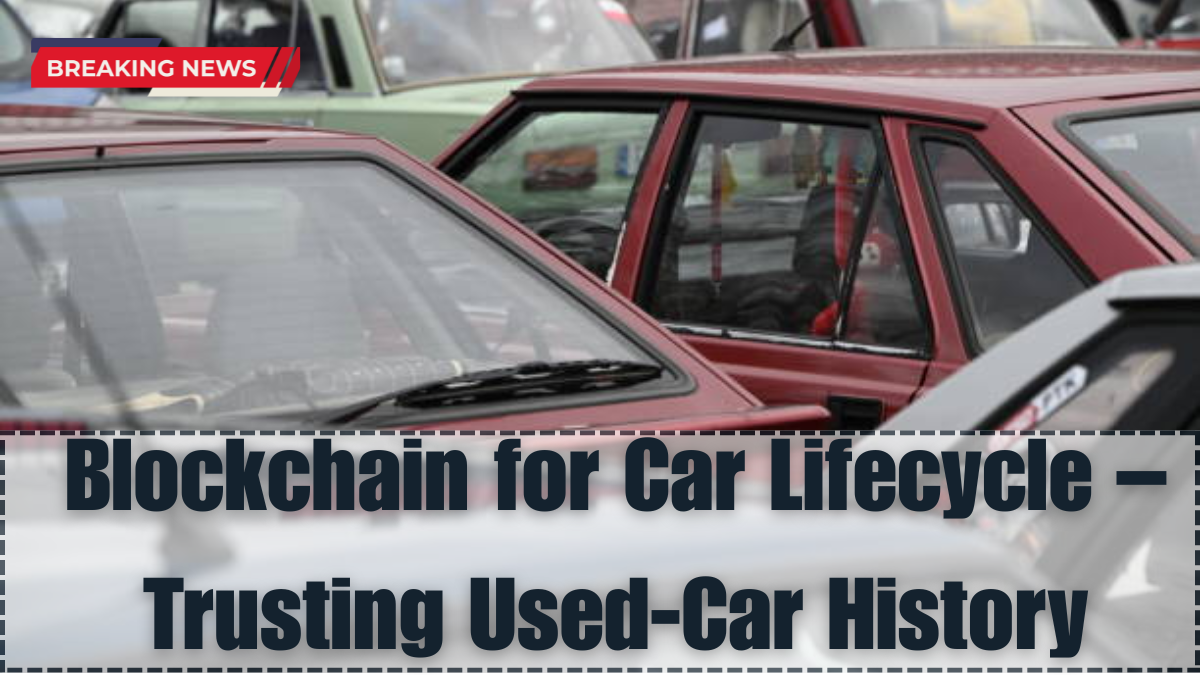In 2025, one of the most groundbreaking digital innovations transforming the Indian automotive industry is the integration of blockchain auto lifecycle systems. Whether you’re buying a used car or selling a fleet vehicle, trust and transparency are critical—and blockchain offers both by creating a tamper-proof, real-time record of every vehicle’s journey from manufacture to resale.
For the Indian used-car market, which is expected to cross 7 million annual transactions, blockchain-backed car records are solving long-standing issues around odometer fraud, incomplete service logs, and disputed ownership.

How Blockchain Works in the Auto Lifecycle
Blockchain is a decentralized digital ledger that allows data to be stored securely, transparently, and immutably. In the context of blockchain auto lifecycle, it tracks and verifies key events in a car’s life, creating a digital passport for every vehicle.
Key data stored on blockchain:
-
Manufacturing origin and VIN registration
-
Ownership history with timestamped transfers
-
Insurance claims and accident reports
-
Service and maintenance records
-
Pollution, fitness, and registration status
Each data entry is time-stamped and cannot be altered, ensuring that the entire car record remains authentic and transparent for future buyers, sellers, insurers, and authorities.
Benefits for Used Car Buyers and Dealers
Blockchain enables a new level of trust in pre-owned vehicle transactions. Buyers can view full maintenance history, accident logs, and verify that odometer readings are genuine.
For the used car ecosystem, this means:
-
Verified ownership chains, reducing title fraud
-
Real-time access to government and service provider data
-
Streamlined loan and insurance approvals
-
Improved resale value for verified, well-maintained cars
-
Secure trade-in processes for dealerships and OEMs
This transparent system transforms the blockchain auto lifecycle into a reliable digital certification for any vehicle.
Implementation in India – Where We Stand
In India, major steps have been taken to integrate blockchain into vehicle management systems. The Ministry of Road Transport and Highways (MoRTH), in partnership with state RTOs and private players, has begun pilot projects in select regions.
Current initiatives include:
-
Blockchain-based Vahan data pilot in Delhi and Maharashtra
-
Partnerships with OEMs like Tata Motors and Mahindra for fleet tracking
-
Used car marketplaces integrating blockchain for verified listings
-
Insurance companies using smart contracts for automated claims
These developments are laying the foundation for a secure, connected, and fraud-proof car ownership and transfer ecosystem.
Smart Contracts for Ownership Transfer & Insurance
One of the biggest innovations within blockchain auto platforms is the use of smart contracts. These are self-executing digital agreements that facilitate ownership transfers, loan settlements, and insurance claims based on predefined rules.
How it works:
| Action | Trigger Event | Smart Contract Execution |
|---|---|---|
| Vehicle Sale | Buyer completes payment | Ownership transferred instantly |
| Insurance Claim | Garage updates damage report | Claim auto-approved based on policy |
| Loan Closure | Bank updates payment status | Vehicle title released |
These smart contracts reduce delays, eliminate middlemen, and bring transparency to all stakeholders in the car record lifecycle.
FAQs
What is blockchain in the context of vehicle ownership?
Blockchain is a secure digital ledger used to store and track a vehicle’s lifecycle history—ownership, service records, accident history, and more.
How does blockchain help used car buyers?
It provides verified, tamper-proof data about a vehicle’s past, ensuring transparency in mileage, accident history, service records, and ownership.
Are blockchain-based vehicle records being used in India?
Yes, pilot programs are already running in Delhi, Maharashtra, and other states, with integration planned across RTOs and insurance systems.
What are smart contracts in vehicle lifecycle management?
Smart contracts are digital protocols that automatically execute ownership transfers, loan clearances, and insurance payouts when conditions are met.
Can blockchain prevent odometer fraud?
Absolutely. Since mileage and service logs are recorded immutably, any tampering can be easily detected by future buyers or insurers.
Click here to know more.
